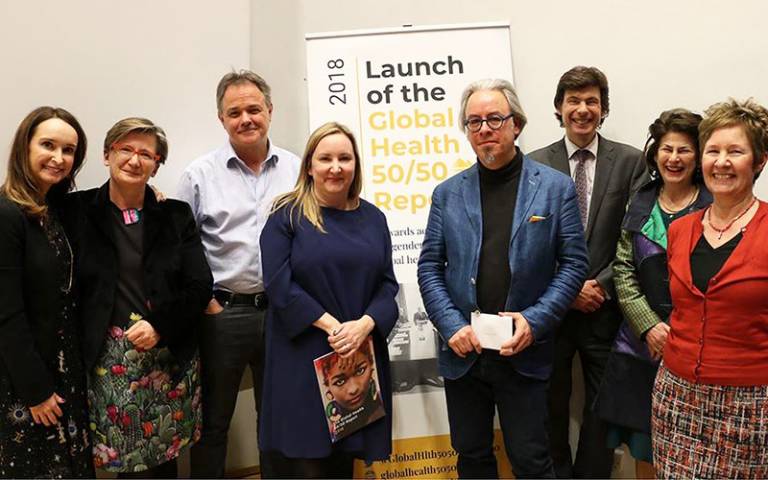Global Health 50/50 launch “drives action for gender equality” across global organisations
9 March 2018
International Women’s Day 2018 saw the launch of the groundbreaking Global Health 50/50 Report launch at UCL's Institute of Child Health

On International Women’s Day, the Global Health 50/50 Report launch at UCL’s Institute of Child Health saw the initiative’s co-directors explore the report’s findings alongside representatives from the global organisations featured.
The first report of its kind, Global Health 50/50 is housed by UCL’s Centre for Gender and Global Health and inspects the policies and practices of 140 top health organisations.
The event marked the culmination of what the project’s co-director Dr Kent Buse, Chief of Strategic Policy Directions at UNAIDS, described as “six months of hard work and analysis.”
Introducing the event, Dame Nicola Brewer, UCL’s Vice-Provost International and Gender Equality Champion, brought up the theme for International Women’s Day 2018: “Press for progress."
She said: “This report is a great way to do just that, by taking an in-depth look at the extent to which 140 global health organisations commit and take action to promote gender equality, both through their programmes and operations and within the workplace.”
An accountability mechanism
Nicola also quoted former New Zealand Prime Minister and adviser to the GH5050 initiative Helen Clark, sharing how she believes the report offers “an accountability mechanism that has been sorely lacking.”
Kent shared how in 2012, he and co-director Sarah Hawkes, Professor of Global Public Health at UCL, first crystallised their thinking about gender and health in a paper for The Lancet.
“We looked at the evidence on the burden of disease going back to the 80s and we looked at the policies of around a dozen global health organisations,” he said.
“The global burden of disease was larger in men and the risk factors were also higher across men […] and the notion of gender was either missing or misunderstood.”
Verifying the data
At the time, he said, it appeared that “the global health community wasn’t ready or willing to talk about gender in any meaningful way.”
But Kent revealed that in the process of verifying the report’s data over the past month, “three organisations have already come to us for advice.”
Sarah explained how the team of researchers initially came up with seven domains to try and assess how organisations were addressing gender.
“The first challenge,” she said, was to assess, “‘Well, what’s a global health organisation?’ We had a couple of criteria: firstly, each organisation had to be present in at least three countries.”
She explained that while it might be surprising to see multi-nationals such as Coca-Cola and Heineken in the report, these companies have publicly stated their intention to influence the UN’s Sustainable Development Goal in health.
Touching on the team’s research around NGOs in particular, Sarah explained how there is a “complete mismatch between what the burden of disease is and what people are working on.”
This observation has led to the report’s recommendation that organisations should move beyond the tendency to conflate gender with women so as to appreciate the “gender-related determinants of everyone’s health.”
“Too much lip service” to equality
Moderator and member of the 50/50 advisory panel Dr Jocalyn Clark, Executive Editor of The Lancet, credited the report with revealing that “a lot of the rhetoric around gender equality isn’t translating into action and accountability.”
She shared how The Lancet is taking its own steps to confront the problem. She said: “We can’t take organisations or individuals at their word on equality. There’s too much lip service - we have to investigate it with deeper analysis.”
Company representatives
Panel member Jeremy Farrar, Director of The Wellcome Trust, delivered his own pledge of support to the initiative, later describing it on Twitter as “Perhaps the most important thing I will do in my career.”
Representatives from some of the 140 companies featured in the report were also keen to stress their own efforts to combat the issues exposed.
“We did relatively well in the report, but that doesn’t mean by any means that we don’t have a lot of work to do,” said Save the Children UK’s Suzanne Taunton.
“We have a gender equity KPI and a gender equity working group, so we’re making movements in the right direction,” she added.
New partnerships
Johnny Baxter, Head of Human Development at DFID, announced DFID’s new gender strategy at the event. He said: “Part of the value of this report is to make us all accountable and I hope that we also end up being accountable for the things we said were going to be.”
The Q&A session that followed suggested this was already the case; an audience member called on Johnny to acknowledge the progress that still needs to be made at organisations including his in terms of recognising and sufficiently providing for non-binary people.
Closing the evening, Kent stressed that while the report is a significant milestone, work is just beginning: “What we want to do is change the lives of people on the ground in countries. This is human resource intensive, so we’ll be looking for new partnerships.”
Links
• Global Health 50/50: UCL News (Chinese translation; Japanese translation)
• Global Health 50/50 Report
• Professor Sarah Hawkes's academic profile
Image
Credit: Ilan Kelman, Twitter
 Close
Close

